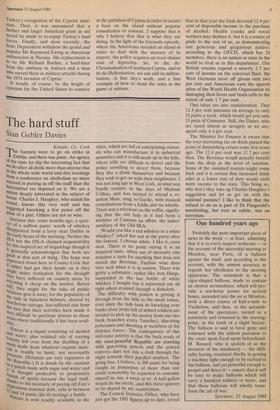The hard stuff
Stan Gebler Davies
Kinsale, Co. Cork The barmen were to go on strike in Dublin, and there was panic. An agency of the state let slip the interesting fact that We do after all drink more than anyone else M the whole wide world and dire warnings from a conference on alcoholism no more Succeed in putting us off the stuff than the horrendous tax imposed on it. We are a Lnation deeply inJ.t who stands his round, knows this very well and has suggested knocking a few pence off the Price of a pint. Others are not so wise.
Instance this: some months.ago, a quar-
ter a million punts' worth of whiskey maPpeared from a lorry near Dublin in me early hours of the orning. Neither the IRA nor the INLA claimed responsibility for this inspired act of brigandage though it Is generally acknowledged that both are good at that sort of thing. The hope was expressed down here in County Cork that rf .either had got their hands on it they Tight make restitution for the drought rueY have inflicted on country areas by reje:as _ mg it cheap on the market. Better still, they might for the sake of public .telations give it away; for the popularity of 'he lads in balaclava helmets, dented by Murderous outrage, has suffered also from the fact that their activities have made it very difficult to purchase poteen in those able. ear where traditionally it has been avail- Poteen is a liquid consisting of alcohol and water, plus residual oils of varying toxicity left over from the distilling of a !lash made from whatever organic mate- "al is readily to hand, not necessarily Potatoes. (Potatoes are very expensive in ine Republic.) It is drunk by the cautious it Punch made with sugar and water and b Is thought preferable to proprietary rands of spirits because the legal stuff, Shanks to the necessity of paying off Eire's ,TPendous national debt, sells at between 12 and 14 punts (£8-10 sterling) a bottle.
poteen is now readily available in the cities, which are full of enterprising crimin- als who can manufacture it in industrial quantities and it is still made up in the hills, where stills are difficult to detect and the police unwilling to detect them, because they like a drink themselves and because they wish to get on with their neighbours. I was not long ago in West Cork, in what was bandit country in the days of Michael Collins, and was invited to attend a re- quiem Mass, sung in Gaelic, with musical contributions from a fiddle and tin whistle. There was a tricolour on the coffin, signify- ing that the old lady in it had been a member of Cumann na nBan, the ladies' auxiliary of the Old IRA.
`Would you like a red whiskey or a white whiskey?' asked her son at the party after the funeral. I choose white. I like it, even neat. There is no point saying it is an acquired taste, when out of necessity one acquires a taste for anything that does not enrich the Revenue. Fuchsia wine does very well when it is in season. There was gritty a substance, rather like iron filings, suspended in the last bottle of white whiskey I bought but it separated out all right when strained through a dishcloth. The difficulty with poteen is getting it through from the hills to the small towns, ever since the lads took to knocking over banks (four jeeps full of armed soldiers are needed to pick up the money from our two bank branches every Tuesday), disrobing policemen and shooting at members of the defence forces. The consequence of this anti-state activity is that the back roads of the once-peaceful Republic are crawling with gun-toting patrols and the poteen convoys dare not risk a dash through the night towards their parched markets. The going fine, I believe, is 500 punts for being caught in possession of more than one could reasonably be expected to consume oneself in, say, a week or so. A half-gallon Would do me nicely, and this thirst appears to be shared by my countrymen.
The Central Statistics Office, who have just got the 1981 figures up to date, reveal that in that year the Irish devoted 12.4 per cent of disposable income to the purchase of alcohol. Health cranks and social workers may deplore it, but it is a source of pride to the rest of us, as demonstrating our generous and gregarious nature: according to the OECD, which has 24 members, there is no nation or state in the world to rival us in this department. Our British cousins expend a miserly 2.3 per cent of income on the convivial fluid, the West Germans stave off gloom only two per cent and Americans earn the approb ation of the World Health Organisation by damaging their livers and brain cells to the extent of only 1.7 per cent.
One takes tax into consideration. That 12.4 per cent amounts on average to only 15 punts a week, which would get you only 13 pints of Guinness. Still, the Danes, who are taxed almost as savagely as we are, spend only 4.4 per cent.
The Minister for Finance is aware that the ever-increasing tax on drink passed the point of diminishing return some five years ago. The 12.4 per cent was 12.7 per cent then. The Revenue woudl actually benefit from the drop in the level of taxation. Some of the vanished tourists might come back and it is certain that increased drink sales at a lower rate of duty would yield more income to the state. This being so, why don't they take up Charles Haughey's suggestion and let us get on with the national pastime? I like to think that the refusal to do so is part of Dr Fitzgerald's unrelenting, but ever so subtle, war on terrorism.






































 Previous page
Previous page